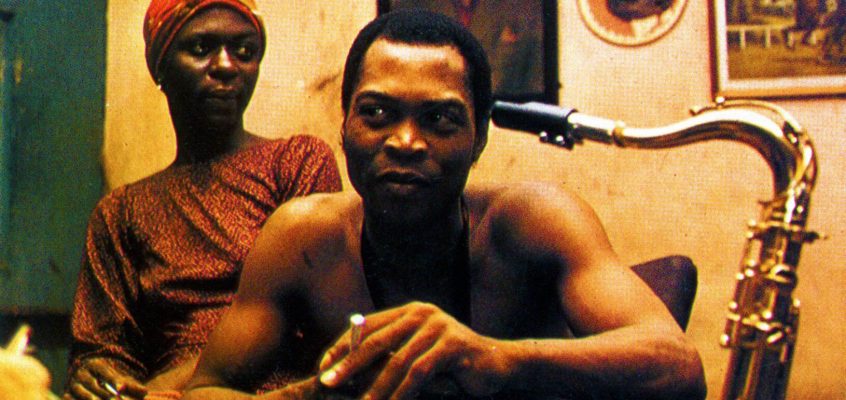 Fela Anikulapo Kuti was a bilingual Nigerian musician and composer. Renowned for being a pioneer of the Afrobeat music, Fela was also known for his human rights and political activism.
Fela Anikulapo Kuti was a bilingual Nigerian musician and composer. Renowned for being a pioneer of the Afrobeat music, Fela was also known for his human rights and political activism.
His music represents both Africa, and his homeland Nigeria, as a vibrant and powerful place. Music journalist Randall Grass described him as one of Africa’s most “challenging and charismatic music performers.”
Kuti wrote in a combination of African English (also called Pidgin) and Yoruba, his native language. Although in truth, since Pidgin exists alongside the various regional languages of Nigeria, it is fair to say African English was also Kuti’s native language.
There is no doubt about the fact that Fela Kuti is a master of the arts. This is demonstrated by the way he is able to express himself in his songs (and beats) with simple, yet powerful combinations of instruments and rhythm. Afrobeat was inspired by traditional West African music, combined with U.S. style funk and jazz. The style often featured chanted vocals, complex intersecting rhythms, and percussion.
Zombie (1976)
Zombie o, zombie (Zombie o, zombie)
Zombie no go stop, unless you tell am to stop (Zombie)
Zombie no go turn, unless you tell am to turn (Zombie)
Zombie no go think, unless you tell am to think (Zombie)
A joro, jara, joro
No break, no job, no sense
A joro, jara, joro
Tell am to go kill
A joro, jara, joro
No break, no job, no sense
A joro, jara, joro
Tell am to go quench
A joro, jara, joro
No break, no job, no sense
A joro, jara, joro
Go and die! (Joro, jaro, joro)
Go and quench! (Joro, jaro, joro)
Put am for reverse! (Joro, jaro, joro)
Joro, jara,…
Literal meaning of the lyrics
The song describes a certain ‘zombie’ which just does as it is told. Furthermore, the lyrics suggest that this creature does not have a mind of its own. As a result, it relies solely on the instructions it receives to carry out operations. The implication expressed is that this zombie can also be used as a tool for highly sinister acts. This is exemplified in the lines “Go and kill; Go and quench.” The lyrics go on to describe how the zombie does not even think for its own safety. No matter what instruction it gets, it is obliged to obey without question. To drive home this point, there is the line “Go and Die!”
Significance of the lyrics
Zombie, released in 1976, was a scathing attack on the Nigerian military and their methods. The album was a huge success and this led to a frightening backlash from the Government. Shortly after it’s release, the military launched a vicious attack on Fela’s compound and recording studio. A thousand soldiers were involved. During the attack, Fela was severely beaten and reportedly only survived due to the intervention of a commanding officer. Fela’s elderly mother was thrown from a window, her injuries were severe and proved to be fatal. Later, Fela Kuti had her coffin delievered to the Dodan Barracks in protest at her treatment. During the attack, Fela’s studio, instruments and master tapes were all destroyed.
Fela used metaphor to make his point – the zombies referred to are the members of the armed forces in Nigeria. The military was frequently used as an instrument of terror by the government of the time. Using intimidation and violence to retain tight control over the fast developing country. “Go and kill.”
During the instrumental section of the song, Fela included many common instructions in the Army, such as “Attention, Quick march, Slow march, Left turn, Right turn, Double up, Salute” and more.
In a beautiful use of the language, he continued with the line: “Joro, Jara Joro”. This quickly became one of the defining lines from the song. Translated loosely, it means Left, Right, Left – the instructions for marching soldiers.
Impact
There is a small percentage of people who take everything the government says without question, and this credulity is also challenged by this definition of a zombie. In all, the song not only criticises, but also seeks reform. In time, the Government and military were required to soften their approach. Both this song, and Fela himself, remain important in Nigeria today. But we must remember that Fela Kuti was first and foremost a remarkable, innovative musician, able to express dissent, while using a beautiful mix of beats and language.

